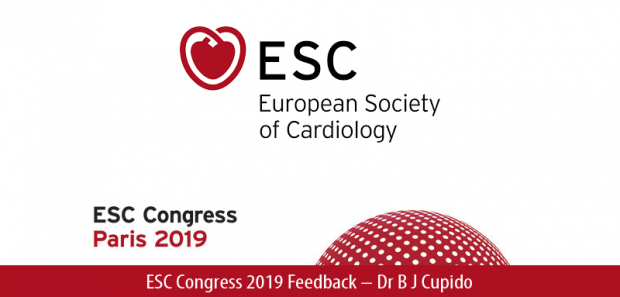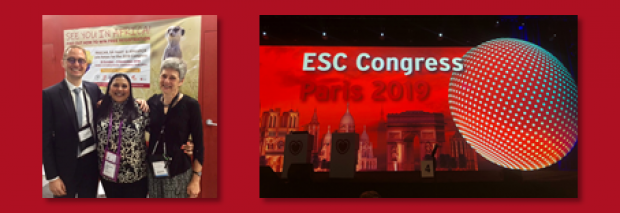ESC Congress 2019 Feedback – Dr BJ Cupido

ESC Congress 2019 Feedback – Dr BJ Cupido
I would like to extend my sincerest gratitude to the HeFFSA executive committee for awarding me the HeFFSA travel grant to facilitate my travel to the ESC congress in Paris this year. The time spend was tremendously rewarding and fruitful. I’d like to summarise my experience:
This year saw the ESC Congress join forces with the World Heart Federation for a combined congress which kicked off on 31 August. The theme of this year’s congress: ‘Global Cardiovascular Health’ came as a breath of fresh air together with the promise from World Heart Federation president, Professor Karen Sliwa to herald an era of joint commitment by these two organisations to global health. The venue was spacious, comfortable and very easy to reach by Paris metro.
My personal Scientific programme highlights were:
- 2019 ESC Clinical Practice Guidelines:
Five new Clinical practice guidelines were launched: Supraventricular tachycardia, Chronic coronary syndromes (previously called Stable coronary disease), Diabetes, Dyslipidemia, Acute Pulmonary Embolus.
The Chronic coronary syndrome guidelines have markedly revised the pre-test probability of disease to try and give a more realistic assessment of the likelihood of CAD. The model in the previous version of the guidelines tended to overestimate disease. The new guidelines suggest that it is safe to defer investigation in patients with a pretest probability of <15%, though it can still be considered if the symptoms are limiting.
Furthermore, the new guidelines gave more prominence to the role of Coronary CT angiography to confirm the diagnosis as an initial test, while the role of exercise testing without imaging has been downgraded from a class I to a IIb indication – to be used IF no functional imaging testing is available.
- The Results of the DAPA-HF Trial:
Prior trials, including EMPAREG showed that SGLT2 (sodium-glucose co-transporter 2) inhibitors in addition to effectively treating diabetes, also reduced the risk of patients developing heart failure. These benefits are seen raljklpidly, even within weeks.
DAPA-HF aimed to assess if these drugs can be used to treat patients with established heart failure including those without diabetes? A total of 4744 patients from 20 countries with heart failure with reduced EF (HFrEF) were randomised to 10mg dapagliflozin vs placebo in addition to standard care. The primary end-point was a composite of worsening heart failure or death from cardiovascular causes, analysed as a time-to-first-event. About 50% of the patients did not have diabetes
Dapagliflozin showed a statistically significant reduction in the risk of the composite endpoint by 26%. (p<0.00001). On individual analysis, the risk of worsening heart failure was reduced by 30% and the risk of CV death reduced by 18%.
Other useful talks:
A number of useful tracts for younger clinicians and budding researchers dealt with issues such as: How to fund your project, How to get your article published in a high-end journal – discussions with the editors...’ These and many more related topics were of particular practical use.
I attended a number of talks relating to Cardio-oncology – a growing field gaining increasing recognition and the importance of adequate screening and what that screening would entails, was covered in a number of talks.
My congress involvement was twofold:
- I have recently been nominated to serve on the ESC Global Affairs Committee as the Deputy Ambassador for Africa, a branch of the ESC currently led by Prof Rick Grobee from the Netherlands. At the ESC congress, we had a number of useful meetings with a few of the cardiac societies in Africa. These meetings served as a needs assessment for the ESC to ascertain how to best serve the cardiology community in Africa. A number of very useful ideas emerged which will be implemented over the next 2 years. Furthermore, the collaboration between SA heart and the ESC not only continues but will strengthen due to a few collaborative efforts in the near future.
- I moderated a poster session on heart failure together with Prof John Cleland. I also presented a plenary talk entitled: ‘Which is the bigger villain: Fats or carbohydrates?’ This is always a rather emotive topic, but good conversation and feedback was received.
These are just a few of my personal highlights. Thank you once again for the opportunity for this funding.

